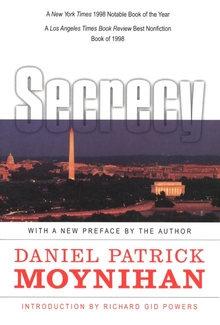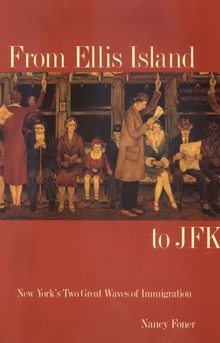Secrecy
WARNING
You are viewing an older version of the Yalebooks website. Please visit out new website with more updated information and a better user experience: https://www.yalebooks.com
The American Experience
Daniel Patrick Moynihan; Introduction by Richard Gid Powers
"[A] signal work on the state of American democracy. . . . A succinct historical analysis of the American culture of secrecy."—Publishers Weekly
“While details of momentous cases, such as the Verona project’s successful break of Soviet code, with the concomitant implication of Alger Hiss and the Rosenbergs, and the Iran-Contra affair, are on public record, it is Moynihan’s skill as a social scientist that integrates them into a succinct historical analysis of the American culture of secrecy.”—Publishers Weekly
"A powerful and timely book."—John Fialka, Washington Monthly
“Moynihan’s book is a refreshing antidote to the academic mush and axe-grinding left-wing criticism that make up much of what it a thin literature on the effectiveness of U.S. intelligence agencies. He uses the new evidence to suggest that there is much fertile ground for research. . . . A powerful and timely book.”—John Fialka, Washington Monthly
"In another of his many thought-provoking books, the senator from New York has taken a calm, collected, and thorough approach to analyzing the problems caused by government secrecy. . . . Once again, Moynihan puts his own stamp on this debate and urges us to rethink this most important question."—Choice
"In this book, Moynihan traces how the system of governmental secrecy developed during the 20th century and how it has blighted prudent policymaking. The documents Moynihan unearthed, Powers maintains, prove dramatically how secrecy changed the history of the cold war, and changed it more lamentably than we had suspected."—America
"As usual, New York’s Democratic Sen. Daniel Patrick Moynihan has the right idea at the right time. In his 18th book, Secrecy: The American Experience, he argues that a "culture of secrecy" has enshrouded and enervated the policies and politics of the United States for the last half century."—Newsday Editorials
"In didactic detail, Moynihan builds an impressive argument that secrecy is not the ointment to preserve democracy but the oil upon which our liberties slip."—James Usher, Baltimore Sun
"[In] Patrick Moynihan’s important new book [he] shows how parts of the U.S. government came to deny vital information to the public and lawmakers and how the intelligence community became suspicious of any information that wasn’t secret, leading to the ridiculous overestimation of the Soviet Union’s strength up to the eve of its collapse."—Michael J. Ybarra, Wall Street Journal
"We can be grateful to Senator Daniel Moynihan for encouraging us to step back and look at one of the deeper issues confronting our nation. The senator is one of those exceptional individuals who deals with the myriad day-to-day issues that confront public figures, but still finds time to study dangerous trends below the surface. The excessive secrecy in our society is certainly one of those. . . . Secrecy deserves more public attention . . . and this book is the best starting point for understanding this phenomenon of our society."—Stansfield Turner, Christian Science Monitor
"Secrecy is marked by Moynihan’s ability to write directly and concisely about complicated political and governmental matters. . . . Moynihan’s understanding of bureaucracy and of politics is phenomenal, but this is not a work of political ’science’; it rests on a very creditable knowledge of history. It contains startling and important revelations, without attempting to become sensation. It is the kind of history whose proper aim is the reduction of untruths."—John Lukacs, Los Angeles Times Book Review
"The single best book of the year—and then some—about law, government, politics and American history. And human nature, too. Written with a flair that is Moynihan’s alone, the book describes with wit and wisdom the baleful impact on our national life of the ever-expanding imposition of governmental secrecy since World War I. It is an extraordinary achievement."—Floyd Abrams, American Lawyer
“Moynihan constructs a compelling argument that government secrecy is the oil upon which all our freedoms first begin to slip.”—Jack Betts, Observer
“Daniel Patrick Moynihan provides a compact history of the U.S. government’s efforts to conceal information over the last century. His account . . . is a strongly argued and thoroughly compelling case for greater openness. . . . Moynihan brings a rare clarity to his analysis of the government’s decision-making process. . . . “Secrecy” is bound to become a standard work on the subject.”—Fred Hamerman, Chicago Tribune
“Moynihan has traced how the system of governmental secrecy developed during the twentieth century and how this secrecy blighted prudent policy making. The documents that he unearthed prove dramatically how secrecy changed the history of the CCold War, and changed it more lamentably than we had suspected.”—Richard Gid Powers, from the Introduction
“While details of momentous cases, such as the Verona project’s successful break of Soviet code, with the concomitant implication of Alger Hiss and the Rosenbergs, and the Iran-Contra affair, are on public record, it is Moynihan’s skill as a social scientist that integrates them into a succinct historical analysis of the American culture of secrecy.”—Publishers Weekly
“In Secrecy: The American Experience . . . [Moynihan] exposes the United States’ bloated and frequently ineffectual intelligence network which, he demonstrates time and again, has either wrongly evaluated or slept through one domestic crisis or international incident after another. The reason for its lack of prescience, he writes, is government’s obsession with secrecy.”—Victor Schaffner, The Empire State Report
“[A] withering account of the Government’s bottomless appetite for 'intelligence'—that is, for collecting, concealing, suppressing, and manipulating it. It is a dismaying tale, though Moynihan has told it with uncommon liveliness and a mordant wit. . . . A historical assessment of the “culture of secrecy,” particularly in the area of foreign policy. . . . It is hard to quarrel with Moynihan’s characterization of cold war secrecy as injuriously all-consuming. . . . Moynihan’s account is engaging and informed.”—Sam Tanenhaus, New York Times Book Review
“[A] withering tour of nearly a century of official secrecy.”—New York Times Book Review
“Moynihan has provided us with an interesting history of secrecy in the United States, and a provocative meditation on the patterns and implications of secrecy in the government.”—Claire Berlinski, National Review
“A readable mini-history of official secrecy in America. . . . Moynihan argues persuasively that overclassification stifles analysis and debate…it deters the healthy self-criticism that is fundamental to our democracy, and it feeds suspicions of conspiracy.”—Robert Turner, Boston Globe
“Moynihan surveys pivotal moments of our recent past, from World War II and the McCarthy Era to the Bay of Pigs and Iran-Contra, to argue that the “routinization of secrecy” has overwhelmed and to a great extent crippled the federal government…As a book about America’s experience with secrecy, Moynihan’s work offers some valuable insights.”—Peter Schweizer, News and Observer
“Moynihan is surely right to deplore the excessive veil of secrecy that has been drawn over much intelligence information and research. He argues persuasively that this shields intelligence officers from much-needed debate and criticism, and allows errors of fact or judgment to go unchallenged.”—Richard Perle, Commentary
“Daniel Patrick Moynihan’s new book is a double-barreled indictment of the uses and abuses of secrecy in the government of the United States. . . . Moynihan is at his best when he dissects the intelligence community’s mistake-hiding ‘culture of secrecy.’ . . . An accomplished social scientist above all else, Moynihan proves in this witty, often personal . . . book that Max Weber’s hundred-year-old observations on the darker side of state power apply to the United States.”—Reuel Marc Gerecht, New Republic
“Moynihan’s achievement is to have made it safe for insiders to criticize government secrecy.”—Steven Aftergood, Bulletin of the Atomic Scientists
"The nation’s most gifted scholar-statesman has produced a marvelous little book, and it should not be missed."—U.S. Naval Institute Proceedings
"Strongly argued. . . . Moynihan has given us a passionate, informed plea for shifting the burden of proof on to those who do call for secrecy, and for making openness the norm to provide security to an open society."—Raymond L. Garthoff, Political Science Quarterly
“[Moynihan’s] argument is a strong one.”—John Wiener, Nation
“Moynihan builds an impressive argument that secrecy is not the ointment to preserve democracy, but the oil upon which our liberties slip.”—James Asher, Staten Island Advance
“The senior U.S. senator from New York analyzes the roots of America’s obsession with government secrecy and convincingly pleads for its dismantling. . . . An intelligent, ironic postmortem on a system that is not only outdated but was flawed from the start.”—Kirkus Reviews
Publication Date: November 10, 1999








